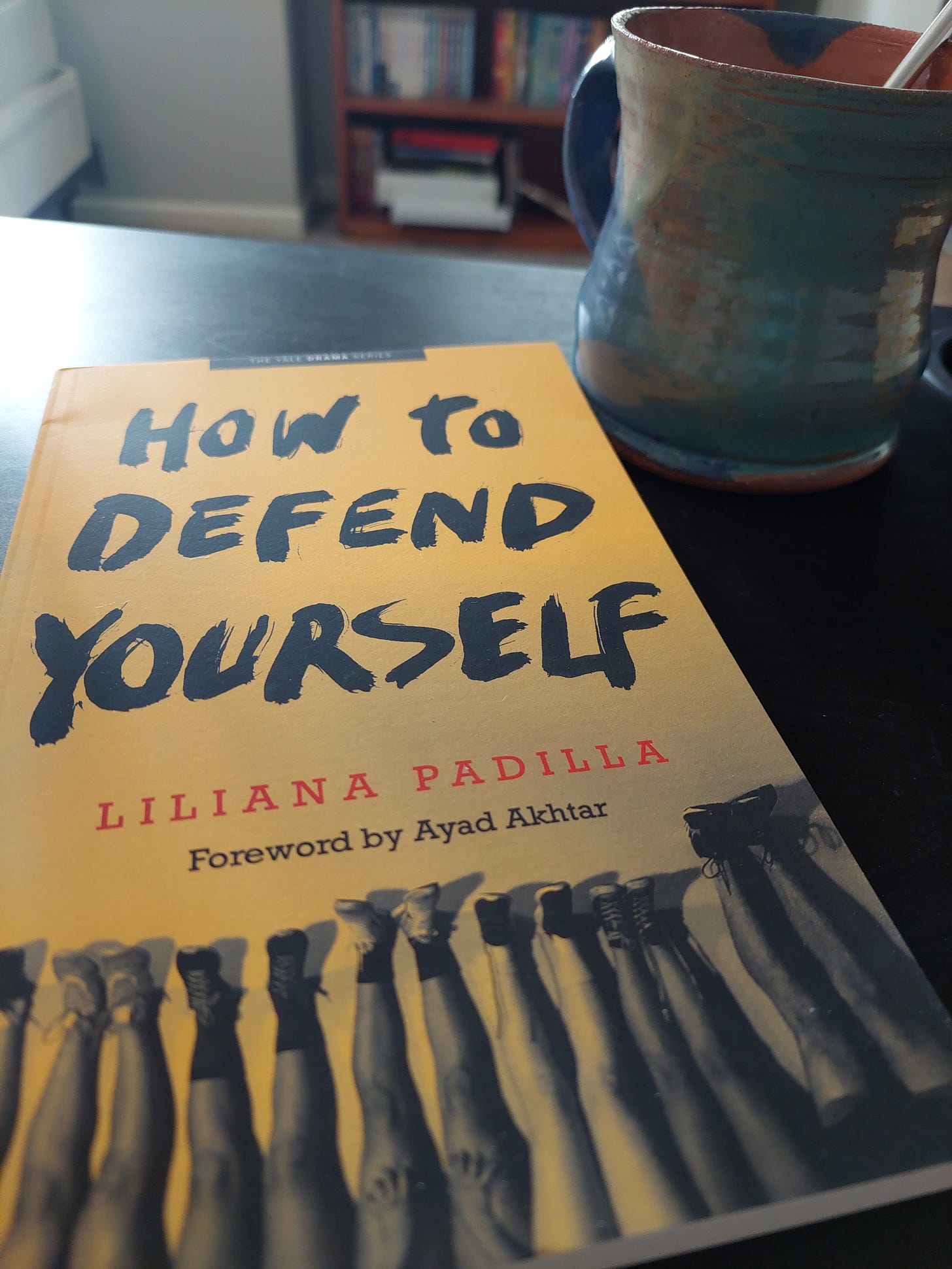How to Defend Yourself
By Liliana Padilla
How to Defend Yourself won the Yale Drama Series’ prize in 2019, leading to the gorgeous publication below. It’s a moving piece about a college self-defense class in the aftermath of a devastating sexual assault. Despite the seemingly clear ‘right and wrong’ of the subject matter, Padilla manages to capture the confusing, questioning humanity in the young people at the center of this piece without saying in any way that sexual assault is ok. This is a meaty reflection on what it means to come of age sexually and how that experience affects women and their social circles differently than it affects men. Just look at this awesome cover:
This play follows a group of young women who are taking (and teaching) a self defense class in the aftermath of a campus sexual assault. The play takes place over five class sessions and includes a variety of young people: Mojdeh, an Iranian girl who desperately wants to rush the sorority hosting this workshop, her friend Diana, who seems to be there because Mojdeh is but is also very excited about the prospect of shooting things, Nikki, who is painfully shy and trying to gain confidence, and finally Brandi and Kara, upperclassmen who are teaching and coordinating the class. They also invite two men — Andy and Eggo — to help with demonstrations and put in their two cents on the relevant issues. As the group grows more comfortable with one another, painful stories emerge and big questions are asked, but rarely answered. We learn more about the assault that inspired this class, and the actors engage in some intensely physical work onstage. This would be a powerhouse production to watch.
Most of the play consists of ensemble work, but there are a few two-person scenes and monologues that could prove useful for acting classes. The majority of scene three is a heated conversation between Mojdeh and Diana which includes a kiss between the two of them. It’s tense and heated (in more ways than one), and if you have the Arab and Latina actors to pull it off, it would be great to work on. Scene Four starts with a scene between Andy and Eggo with a good back and forth about how to be a good ally and the feelings that come from witnessing an assault. Eggo should be played by a person of color, but that still leaves good flexibility for the scene. Towards the end of Scene 4, Kara and Diana have a fun, physical scene in which they fight each other while processing their experiences in the class and in the world. You really need a fight choreographer for this one (and a Latina actor to play Diana), but if you could pull it off, it would be stunning. Finally, Nikki and Brandi each have a moving, emotional monologue toward the end of the piece. Nikki is a person of color and Brandi is white, so one monologue or the other should work for any fem actor needing a monologue.
Here’s some other helpful info:
Genre: Drama
First Production: 2019
Cast: 5 women, 1 girl, 2 men
Casting Opportunities and Challenges: The racial breakdowns are clear and require one Iranian actor, one Mexican-American actor, two white actors, two people of color, one actor of any race, and one child of color.
Ideal Performance Space: Black Box, Proscenium
Technical Opportunities and Challenges: There is so much violence and intimacy in this piece! Everyone involved should have a good working knowledge of violence and intimacy design practices, and it will also need an intimacy director who is separate from the primary director.
Ideal Production Company: University Theatre and Regional Theatre — I think it would be a stretch for the audiences and skill sets of most community theatres, but maybe yours is the one to do it!
Passes the Bechdel Test: Yes!
Themes: Political, Sexual Assault, Physical, Sorority, Rape Culture, University, Intersectionality, Gender, Strong Women, Centers female characters, Centers characters of color, Violence, Intimacy, Toxic Masculinity
Major Dramatic Question: How will these young people cope with the recent campus sexual assault?
What was the writer trying to do? Were they successful?
Padilla seems to be exploring the nuances behind campus sexual assault without letting anyone off the hook with easy answers. This makes for a very successful, and very physical, piece of work that is made for and respects the young people at its center.
Why this play now?
Campus sexual assault is still rampant, and is likely to continue to be an issue as long as young people are figuring out how to live in the world as sexual beings. We can hope that it will improve, but this play doesn’t offer easy solutions and, as such, I think it has a longevity that will outlast many similar pieces.
Up Next on my TBR:
“Four Comic Interludes” by Feliciana Enríquez de Guzmán
Vanity Fair by Kate Hamill
Chad Curtiss, Lost Again by Arthur Kopit
As a bonus, this play makes me want to re-read Period Sisters by Ali Viterbi, and it makes sense that Viterbi is mentioned several times in the thank yous at the back of the book.
What’s on your summer reading list?


